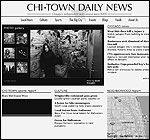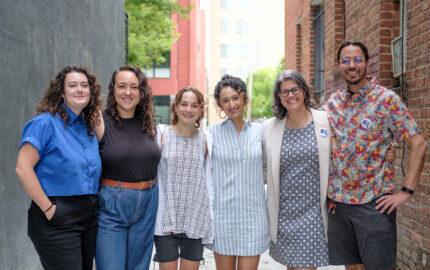In November 2005, I placed an ad on craigslist that changed my life—and altered the media landscape in Chicago. This was my first public acknowledgment of plans I had to launch a Web site. My ad said I was looking for volunteers who wanted to write for a nonprofit local news organization.
I didn’t have a lot of practical details about how this new operation would function. Who would fund it? Who would read it? Who would write for it? These were some of the key questions that I couldn’t answer. Nevertheless, the basic framework turned out to be enough of a powerful force to propel me, my idea, and those who responded to my ad forward.
My vision was this: build an online news organization with a relentless, exclusive focus on Chicago. We’d cover the city’s six-dozen neighborhoods by recruiting a volunteer citizen journalist in each one. We’d offer training and editing so that what our volunteers submitted—words or sound or visuals—would include the best reporting possible. We would assemble a small group of full-time reporters to cover citywide beats. And we’d investigate the people and institutions too often granted a pass by traditional local news outlets.
My Motivation
I decided to start ChiTownDailyNews.org after spending four years as an investigative reporter at the Chicago Tribune. My time there convinced me that our city’s newspapers were doing a terrible job of covering Chicago. The Tribune didn’t regularly cover the Chicago Housing Authority, an agency that spends millions in public funds every year. Chicago has the nation’s largest civil justice system, but no reporter was assigned to cover it full time. Each Chicago public school has a local school council, independently elected to set the annual budget and evaluate the principal, and they meet each month. Nobody at the paper covered those meetings. The Tribune had more reporters stationed in Europe than on the South Side of Chicago.
Of course, the Tribune and its traditional news siblings are staffed to serve a reader who doesn’t exist anymore. When I spoke to a college journalism class recently, I asked those who counted the Tribune as their primary source of international news to raise their hands. None did. Readers are apt to follow international news through the BBC Web site and national news on CNN.com or nytimes.com. They read their local newspaper’s Web site for local news.
The game has changed; newspapers can no longer assume that they’re the only source for their readers. Reporting by a smattering of foreign correspondents no longer makes a news organization a go-to destination for world news. If the local paper’s foreign report isn’t as comprehensive as The New York Times, then why read it when nytimes.com is just a click away? And at many newspapers, some of the best reporters are being shown the door in an effort to cut payrolls and meet inflated earnings targets. The story is the same in city after city: fewer reporters, editors and photographers, a smaller news hole, and a higher newsstand price. It became difficult for me to see how that equation served readers.
I was also feeling for the first time in my 10 years as a newspaper reporter that journalism was boring. Good journalism involves risk—for reporters, risk can mean getting killed or being sued; for a newspaper, it can mean killing off print readers in pursuit of a better Web site. Taking such risks is what makes journalism exciting. But newspapers seem to hate risk. Many newsrooms chase after stories others have done instead of demanding original reporting. Investigative projects can languish as editors worry about offending the powerful. Declining readership spreads, as newsroom managers try everything but what needs to be done: betting it all on the Web.
Our Experiment
I met the volunteers who responded to my ad at a popular North Side watering hole. About a dozen journalists and soon-to-be journalists showed up, most of them eager to get started. For the next few weeks, I struggled to raise money and build a board of directors. I imagined that ChiTownDailyNews.org would be launched several months into the hazy future. But as we kept talking, the volunteers’ enthusiasm became contagious. They made me realize that there were very few obstacles to launching this Web site. We had no money, but we didn’t need any; Web site hosting costs $20 a month. We had no rich folks vying to join the board but, with $20 a month in expenses, we didn’t need them, either.
What we had was a Web site prototype, a working content-management system, and a handful of dedicated volunteers. The site, I figured, would either find its niche within a few months and attract funders, writers and readers. Or it wouldn’t. Either way, I thought, it would be an interesting experiment.
It has certainly been that and, as I set out to build a new kind of news organization, it’s been a huge departure from the world of big-budget newspapers. The big differences: We are relentlessly local. We pursue risky stories and experiment with cutting-edge Web technology. We also invite reader participation and have broken away from the traditional ownership model and operate as a nonprofit institution.
So far, it’s working. We’ve survived for two years. More than 15,000 people visit the site each month, though we spend no money on advertising. We have more than 300 people registered to submit content. We were finalists this year for a prestigious Online News Association investigative reporting award. We regularly break news, and our stories often start vigorous comment threads on the site.
RELATED WEB LINK
“A Man of Two Lives,” an ONA award finalist
– chitowndailynews.org/Earlier this year, the John S. and James L. Knight Foundation awarded a $340,000 grant to help us build and train our network of 75 volunteer neighborhood journalists. We’re hitting our recruiting targets with volunteers, and people with little or no previous journalism experience have contributed some compelling content. Mark Draughn, who covers the community of Jefferson Park, has done an excellent job of keeping readers up-to-date on issues raised at neighborhood community policing meetings. And citizen journalist Alex Parker jumped off a city bus when he saw fire trucks surrounding a lakefront high-rise. His coverage of this fatal apartment fire was comprehensive and quick, making us the first Chicago news organization to post details.
Good reporting has come, too, from our crew of full-time, beat-reporting interns on whom we depend for coverage of beats like city hall, the public schools, and public transportation. These are ever-present, ongoing stories that demand more time and experience than most citizen journalists can give. In the future, we want to transition these internships into full-time, paid reporting positions. This would give us a core crew of journalists to produce a regular flow of copy and share their knowledge with our volunteers.
We have some difficult challenges, as do similar start-up, online news organizations. Pushing our traffic numbers higher requires a steady flow of fresh content. But relying on citizen journalists and a small group of beat-reporting interns for this content makes it tough to predict when we’ll have new stories and how many of them we’ll have.
Ethical dilemmas abound. Those who are most interested in writing for our site are often very much invested in what happens in their neighborhoods and involved in a host of other organizations. Asking them to give up those activities for the sake of journalistic objectivity would discourage many and rob other community organizations of participants. Instead of barring such involvement, we make sure writers avoid covering issues with which they’ve had prior involvement. But this requirement creates friction. Though we strive to be as inclusive as possible, some folks have their fingers in so many pies that finding an interesting topic they can write about is almost impossible.
These obstacles are journalistic and can likely be resolved with careful consideration and hard work. We face some business challenges that are far more vexing. Sales of advertisements were a huge part of our initial business plan, accounting for nearly 50 percent of our revenue. Yet we’ve sold fewer than 10 ads so far, earning less than $1,000. (This is a problem of scale: with 200,000 page views a month, our maximum ad revenue potential is about $2,000.) And ads, as I’ve discovered to my great dismay, don’t sell themselves. And we can’t pay a salesman on $2,000 a month.
We’re also finding that foundations, with the exception of Knight, are not especially receptive to paying for the work of gathering news. Many fund journalism school programs; others support studies done on the relationship between the news media and the public. Very few write checks for the purpose of hiring reporters.
That is unfortunate, because the availability of such funding could well determine what kind of organizations will deliver news in future years. Will the next generation of news organizations be launched as nonprofits and become valued community institutions? Or will they need to become for-profit companies and inevitably confront the same profit vs. public service conflict that is decimating so many of our best newspapers?
ChiTownDailyNews.org has come close to folding once or twice during the past two years. Right now it’s unclear whether we’ll raise the $500,000 or more that we need to hire beat and investigative reporters to supplement our crew of volunteers. What we do have more of each day are readers. That alone is worth celebrating, given what a rarity it is in the news business today.
Geoff Dougherty is editor of Chi-Town Daily News, a nonprofit online newspaper covering Chicago.
I didn’t have a lot of practical details about how this new operation would function. Who would fund it? Who would read it? Who would write for it? These were some of the key questions that I couldn’t answer. Nevertheless, the basic framework turned out to be enough of a powerful force to propel me, my idea, and those who responded to my ad forward.
My vision was this: build an online news organization with a relentless, exclusive focus on Chicago. We’d cover the city’s six-dozen neighborhoods by recruiting a volunteer citizen journalist in each one. We’d offer training and editing so that what our volunteers submitted—words or sound or visuals—would include the best reporting possible. We would assemble a small group of full-time reporters to cover citywide beats. And we’d investigate the people and institutions too often granted a pass by traditional local news outlets.
My Motivation
I decided to start ChiTownDailyNews.org after spending four years as an investigative reporter at the Chicago Tribune. My time there convinced me that our city’s newspapers were doing a terrible job of covering Chicago. The Tribune didn’t regularly cover the Chicago Housing Authority, an agency that spends millions in public funds every year. Chicago has the nation’s largest civil justice system, but no reporter was assigned to cover it full time. Each Chicago public school has a local school council, independently elected to set the annual budget and evaluate the principal, and they meet each month. Nobody at the paper covered those meetings. The Tribune had more reporters stationed in Europe than on the South Side of Chicago.
Of course, the Tribune and its traditional news siblings are staffed to serve a reader who doesn’t exist anymore. When I spoke to a college journalism class recently, I asked those who counted the Tribune as their primary source of international news to raise their hands. None did. Readers are apt to follow international news through the BBC Web site and national news on CNN.com or nytimes.com. They read their local newspaper’s Web site for local news.
The game has changed; newspapers can no longer assume that they’re the only source for their readers. Reporting by a smattering of foreign correspondents no longer makes a news organization a go-to destination for world news. If the local paper’s foreign report isn’t as comprehensive as The New York Times, then why read it when nytimes.com is just a click away? And at many newspapers, some of the best reporters are being shown the door in an effort to cut payrolls and meet inflated earnings targets. The story is the same in city after city: fewer reporters, editors and photographers, a smaller news hole, and a higher newsstand price. It became difficult for me to see how that equation served readers.
I was also feeling for the first time in my 10 years as a newspaper reporter that journalism was boring. Good journalism involves risk—for reporters, risk can mean getting killed or being sued; for a newspaper, it can mean killing off print readers in pursuit of a better Web site. Taking such risks is what makes journalism exciting. But newspapers seem to hate risk. Many newsrooms chase after stories others have done instead of demanding original reporting. Investigative projects can languish as editors worry about offending the powerful. Declining readership spreads, as newsroom managers try everything but what needs to be done: betting it all on the Web.
Our Experiment
I met the volunteers who responded to my ad at a popular North Side watering hole. About a dozen journalists and soon-to-be journalists showed up, most of them eager to get started. For the next few weeks, I struggled to raise money and build a board of directors. I imagined that ChiTownDailyNews.org would be launched several months into the hazy future. But as we kept talking, the volunteers’ enthusiasm became contagious. They made me realize that there were very few obstacles to launching this Web site. We had no money, but we didn’t need any; Web site hosting costs $20 a month. We had no rich folks vying to join the board but, with $20 a month in expenses, we didn’t need them, either.
What we had was a Web site prototype, a working content-management system, and a handful of dedicated volunteers. The site, I figured, would either find its niche within a few months and attract funders, writers and readers. Or it wouldn’t. Either way, I thought, it would be an interesting experiment.
It has certainly been that and, as I set out to build a new kind of news organization, it’s been a huge departure from the world of big-budget newspapers. The big differences: We are relentlessly local. We pursue risky stories and experiment with cutting-edge Web technology. We also invite reader participation and have broken away from the traditional ownership model and operate as a nonprofit institution.
So far, it’s working. We’ve survived for two years. More than 15,000 people visit the site each month, though we spend no money on advertising. We have more than 300 people registered to submit content. We were finalists this year for a prestigious Online News Association investigative reporting award. We regularly break news, and our stories often start vigorous comment threads on the site.
RELATED WEB LINK
“A Man of Two Lives,” an ONA award finalist
– chitowndailynews.org/Earlier this year, the John S. and James L. Knight Foundation awarded a $340,000 grant to help us build and train our network of 75 volunteer neighborhood journalists. We’re hitting our recruiting targets with volunteers, and people with little or no previous journalism experience have contributed some compelling content. Mark Draughn, who covers the community of Jefferson Park, has done an excellent job of keeping readers up-to-date on issues raised at neighborhood community policing meetings. And citizen journalist Alex Parker jumped off a city bus when he saw fire trucks surrounding a lakefront high-rise. His coverage of this fatal apartment fire was comprehensive and quick, making us the first Chicago news organization to post details.
Good reporting has come, too, from our crew of full-time, beat-reporting interns on whom we depend for coverage of beats like city hall, the public schools, and public transportation. These are ever-present, ongoing stories that demand more time and experience than most citizen journalists can give. In the future, we want to transition these internships into full-time, paid reporting positions. This would give us a core crew of journalists to produce a regular flow of copy and share their knowledge with our volunteers.
We have some difficult challenges, as do similar start-up, online news organizations. Pushing our traffic numbers higher requires a steady flow of fresh content. But relying on citizen journalists and a small group of beat-reporting interns for this content makes it tough to predict when we’ll have new stories and how many of them we’ll have.
Ethical dilemmas abound. Those who are most interested in writing for our site are often very much invested in what happens in their neighborhoods and involved in a host of other organizations. Asking them to give up those activities for the sake of journalistic objectivity would discourage many and rob other community organizations of participants. Instead of barring such involvement, we make sure writers avoid covering issues with which they’ve had prior involvement. But this requirement creates friction. Though we strive to be as inclusive as possible, some folks have their fingers in so many pies that finding an interesting topic they can write about is almost impossible.
These obstacles are journalistic and can likely be resolved with careful consideration and hard work. We face some business challenges that are far more vexing. Sales of advertisements were a huge part of our initial business plan, accounting for nearly 50 percent of our revenue. Yet we’ve sold fewer than 10 ads so far, earning less than $1,000. (This is a problem of scale: with 200,000 page views a month, our maximum ad revenue potential is about $2,000.) And ads, as I’ve discovered to my great dismay, don’t sell themselves. And we can’t pay a salesman on $2,000 a month.
We’re also finding that foundations, with the exception of Knight, are not especially receptive to paying for the work of gathering news. Many fund journalism school programs; others support studies done on the relationship between the news media and the public. Very few write checks for the purpose of hiring reporters.
That is unfortunate, because the availability of such funding could well determine what kind of organizations will deliver news in future years. Will the next generation of news organizations be launched as nonprofits and become valued community institutions? Or will they need to become for-profit companies and inevitably confront the same profit vs. public service conflict that is decimating so many of our best newspapers?
ChiTownDailyNews.org has come close to folding once or twice during the past two years. Right now it’s unclear whether we’ll raise the $500,000 or more that we need to hire beat and investigative reporters to supplement our crew of volunteers. What we do have more of each day are readers. That alone is worth celebrating, given what a rarity it is in the news business today.
Geoff Dougherty is editor of Chi-Town Daily News, a nonprofit online newspaper covering Chicago.




